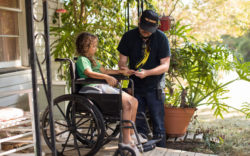There’s a lot that’s changed in the eight years separating my two children. For example, iPhones now exist. The birthing suites at both hospitals in town have undergone a makeover (some even with tubs!). And breastfeeding in public is now an accepted practice.
I’m not saying it was never appropriate to feed your baby in public before, but in the years since my daughter was born, a new law requires companies to accommodate nursing mothers; we’ve campaigned around this town (and across the country, really) to have businesses post breastfeeding-friendly stickers on their doors; and we’re also pretty good at openly mocking the occasional establishment that tries to shut down a breastfeeding mom.
But what we still haven’t quite gotten our heads around is the actual act of breastfeeding—at least, in a way that prepares a mom for what’s to come. The act of having the baby gets all the attention—and, yes, one could argue that it should. But we all seem to gloss over the fact that within days of giving life to a new human, your body then begins to produce milk that will sustain this new life for the next six to 12 months or more. Not only is it mind-blowing, but it fundamentally changes your body in a way you’ve never experienced before, at a time when all you want to do is get back to your normal body.
If I could go back in time to the 24 hours I spent in the hospital postpartum, I would grab that lactation consultant’s hand, pull her into the room, and ask her to explain a proper latch and show me different ways to hold my baby. Rather than lightly laugh and say, “No, I got this” as I wave her away, I would request that she stop by a second time to have me go through the motions again to be sure I was on the right track. And then I would have her give me a card with the hospital’s drop-in breastfeeding class information so I could go home, put it on my fridge, and then go in three days later when I’m in pain.
(Note to hospitals: Hire more lactation consultants.)
What I really, really wish the lactation consultant had told me, while I lay in bed with a tiny, squirmy, sleepy baby, was the hard truth: Breastfeeding is hard and overwhelming and painful at first. You will be frustrated and sore and tired and feel like your baby is not getting enough to eat.
But it does get better, I promise. Just like your body recovers from the birth process, your body (and your new baby) also adjusts to this crazy new thing that your breasts do. It’s hard, but if you can make it through the first two weeks, then you can make it through the next two weeks. And then you’ll be a month in and so much better at this than you once were.
It. Gets. Better.
I say this because, after having attended breastfeeding support classes in several locations across Athens, this is the one thing that everyone, finally, tells the handful of new moms in the room. I’m passing it on here because I wish someone had told me this before my children were born.
If you take away nothing else from this column today, understand this: The first thing you should do when that baby comes out of you is put it on your breast. Keep practicing at the hospital. Call the lactation consultant to be sure it’s going OK (even if you think it’s fine), and be prepared for several weeks of struggle before it starts to click.
Here’s a quick run-down of where you can go to get some support. If you want, go before you have that baby, but expect to go back, because I promise you, nothing will make sense until you’re holding that baby and have accepted the fact that your breasts are no longer yours (and you’ve gone outside to check the mail with only half of your tank top on… not that that’s ever happened to me).
Monday: 10:30 a.m.–12 p.m. (first and third Mondays), Black Mothers Breastfeed, Athens-Clarke County Library Multipurpose Room, 2525 Baxter St.
1–3 p.m., Bundles of Joy Breastfeeding Support Group, St. Mary’s Hospital
6:30–8:30 p.m., Mother Care Breastfeeding Support Group, Athens Regional Medical Center
Tuesday: 10–11:30 a.m., La Leche League, The Natural Baby, 1590 Prince Ave.
Wednesday: 4–6 p.m., Breastfeeding support provided by By your Leave, Reblossom Mama & Baby (220 N. Milledge Ave.)
Thursday: 10:30 a.m.–12 p.m., Toddle Time, St. Mary’s (aimed at toddlers and second-time moms, although lactation support is also offered)
11 a.m.–2 p.m., New Moms’ Group, Reblossom (not specifically lactation focused, but a good place to get some tips and peer support)
6:30–8:30 p.m., Mother Care Breastfeeding Support Group, Athens Regional Medical Center
Saturday: 10:30 a.m.–12:30 p.m., Breastfeeding support provided by By Your Leave, Reblossom
Note, too, that whether you gave birth at ARMC or St. Mary’s—or somewhere else —both hospitals have lactation consultants who can help you outside of these support groups. ARMC also offers a Breastfeeding Basics class once a month; visit athenshealth.org for details.
Like what you just read? Support Flagpole by making a donation today. Every dollar you give helps fund our ongoing mission to provide Athens with quality, independent journalism.










